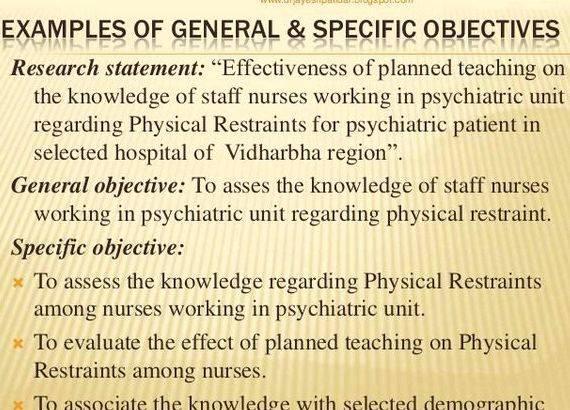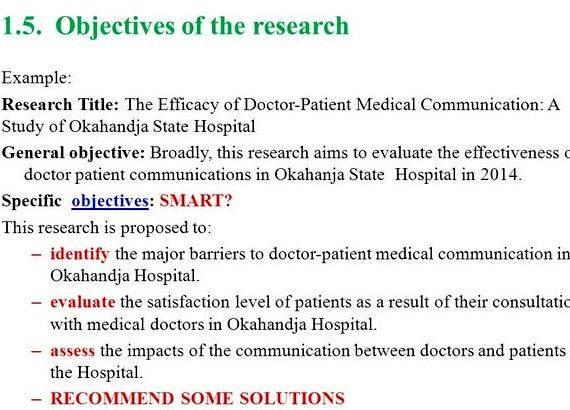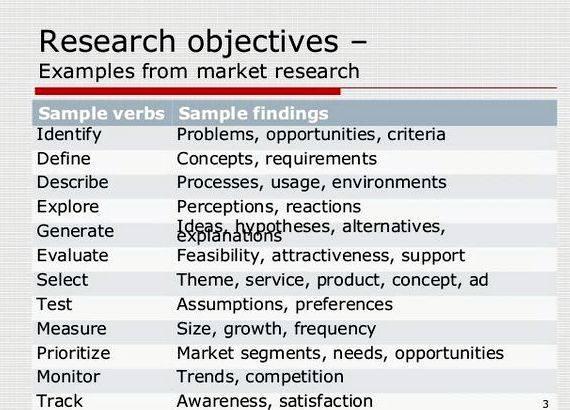

While your problem formulation serves to describe the aim of your thesis, the objectives provide an accurate description of the specific actions you will take in order to reach this aim. As with the problem formulation, the overall objective should be framed in a single sentence.
Once again, take a look at the problem formulation from the previous lesson: “Is the level of knowledge on recommended nutritional practices related to the nutritional status of pregnant women attending antenatal care in Northern Uganda?”
The correspondent overall objective should be written as an infinitive sentence e.g.:
“To analyse the association between nutritional knowledge and the nutritional status of pregnant women attending antenatal care (ANC) in Northern Uganda.
Here you see that the overall objective states exactly how you intend to address your problem: “I want to find the answer to problem A, by completing action B”. You then have to explain or detail action B through a set of specific objectives (usually between two and four), e.g.:
- To assess the knowledge level among ANC attendees on the recommended nutritional practices during pregnancy
- To assess the nutritional status of pregnant women attending ANC
- To analyse the statistical association between nutritional knowledge level and nutritional status in pregnant women attending ANC
Each specific objective consists of one infinitive sentence and should be phrased in a way that makes it possible to draw a conclusion from within the scope of the thesis.

The more precisely you formulate your specific objectives, the simpler it will be to define the type of study and which method(s) you will use in your further research.

You can refine your specific objective by clearly stating if your given action is to understand, analyse or create in tune with the hierarchy of learning objectives and the key to the assessment of knowledge content as found in for example Bloom’s taxonomy. In this way, your specific objectives will signal your level of ambition as well as where you will place the greatest effort in your thesis.
TIP!
Your well-defined research objectives will help you identify the type of study you will do. Practical limitations and/or advice from your supervisor may require that you reformulate all or some of your objectives. Don’t worry; this is all part of the research process.
Do you now know how to formulate objectives? Test your knowledge in the following.
refine well-defined
Did you know.
that the time you spend, to refine and define your overall research objective and your specific objectives, is well spent and will pay back many-fold. Once your research objectives are ready, you have completed half of your thesis requirements – the remaining half is straightforward, hands-on work!
. that your well-defined research objectives will help you identify the type of study you will do. Practical limitations and/or advice from your supervisor may require that you reformulate all or some of your objectives. Don’t worry; this is all part of the research process.
Better Thesis
– is a joint production by: University of Southern Denmark Library and the Unit for health promotion research.

University of Copenhagen, Department of International Health and Faculty Library of Natural and Health Sciences
In collaboration with Denmark’s Electronic Research Library (DEFF)
1.04 How to write a literature review
What is a literature review?
The aim of a literature review is to show your reader (your tutor) that you have read, and have a good grasp of, the main published work concerning a particular topic or question in your field. This work may be in any format, including online sources. It may be a separate assignment, or one of the introductory sections of a report, dissertation or thesis. In the latter cases in particular, the review will be guided by your research objective or by the issue or thesis you are arguing and will provide the framework for your further work.
It is very important to note that your review should not be simply a description of what others have published in the form of a set of summaries, but should take the form of a critical discussion, showing insight and an awareness of differing arguments, theories and approaches. It should be a synthesis and analysis of the relevant published work, linked at all times to your own purpose and rationale.
According to Caulley (1992) of La Trobe University, the literature review should:
• compare and contrast different authors’ views on an issue
• group authors who draw similar conclusions
• criticise aspects of methodology
• note areas in which authors are in disagreement
• highlight exemplary studies
• highlight gaps in research
• show how your study relates to previous studies
• show how your study relates to the literature in general
• conclude by summarising what the literature says
The purposes of the review are:
• to define and limit the problem you are working on
• to place your study in an historical perspective
• to avoid unnecessary duplication
• to evaluate promising research methods
• to relate your findings to previous knowledge and suggest further research
A good literature review, therefore, is critical of what has been written, identifies areas of controversy, raises questions and identifies areas which need further research.
Structure of the literature review
The overall structure of your review will depend largely on your own thesis or research area. What you will need to do is to group together and compare and contrast the varying opinions of different writers on certain topics. What you must not do is just describe what one writer says, and then go on to give a general overview of another writer, and then another, and so on. Your structure should be dictated instead by topic areas, controversial issues or by questions to which there are varying approaches and theories. Within each of these sections, you would then discuss what the different literature argues, remembering to link this to your own purpose.
Linking words are important. If you are grouping together writers with similar opinions, you would use words or phrases such as:
similarly, in addition, also, again
More importantly, if there is disagreement, you need to indicate clearly that you are aware of this by the use of linkers such as:
however, on the other hand, conversely, nevertheless
At the end of the review you should include a summary of what the literature implies, which again links to your hypothesis or main question.
You first need to decide what you need to read. In many cases you will be given a booklist or directed towards areas of useful published work. Make sure you use this help. With dissertations, and particularly theses, it will be more down to you to decide. It is important, therefore, to try and decide on the parameters of your research. What exactly are your objectives and what do you need to find out? In your review, are you looking at issues of theory, methodology, policy, quantitive research, or what? Before you start reading it may be useful to compile a list of the main areas and questions involved, and then read with the purpose of finding out about or answering these. Unless something comes up which is particularly important, stick to this list, as it is very easy to get sidetracked, particularly on the internet.
A good literature review needs a clear line of argument. You therefore need to use the critical notes and comments you made whilst doing your reading to express an academic opinion. Make sure that:
• you include a clear, short introduction which gives an outline of the review, including the main topics covered and the order of the arguments, with a brief rationale for this.
• there is always a clear link between your own arguments and the evidence uncovered in your reading. Include a short summary at the end of each section.
Use quotations if appropriate.
• you always acknowledge opinions which do not agree with your thesis. If you ignore opposing viewpoints, your argument will in fact be weaker.
Your review must be written in a formal, academic style. Keep your writing clear and concise, avoiding colloquialisms and personal language. You should always aim to be objective and respectful of others’ opinions; this is not the place for emotive language or strong personal opinions. If you thought something was rubbish, use words such as inconsistent, lacking in certain areas or based on false assumptions! (See Guide 1.21)
When introducing someone’s opinion, don’t use says, but instead an appropriate verb which more accurately reflects this viewpoint, such as argues, claims or states. Use the present tense for general opinions and theories, or the past when referring to specific research or experiments:
Although Trescothick (2001) argues that attack is the best form of defence, Boycott (1969) claims that.
In a field study carried out amongst the homeless of Sydney, Warne (1999) found that.
And remember at all times to avoid plagiarising your sources. Always separate your source opinions from your own hypothesis. making sure you consistently reference the literature you are referring to. When you are doing your reading and making notes, it might be an idea to use different colours to distinguish between your ideas and those of others. (See Guide 1.13).
Here is a final checklist, courtesy of the University of Melbourne:
Selection of Sources
Have you indicated the purpose of the review?
Are the parameters of the review reasonable?
Why did you include some of the literature and exclude others?
Which years did you exclude?
Have you emphasised recent developments?
Have you focussed on primary sources with only selective use of secondary sources?
Is the literature you have selected relevant?
Is your bibliographic data complete?
Critical Evaluation of the Literature
Have you organised your material according to issues?
Is there a logic to the way you organised the material?
Does the amount of detail included on an issue relate to its importance?
Have you been sufficiently critical of design and methodological issues?
Have you indicated when results were conflicting or inconclusive and discussed possible reasons?
Have you indicated the relevance of each reference to your research?
Has your summary of the current literature contributed to the reader’s understanding of the problems?
Does the design of your research reflect the methodological implications of the literature review?
The literature review will be judged in the context of your completed research.
The review needs to further the reader’s understanding of the problem and whether it provides a rationale for your research.
Links to further resources on writing dissertations
Previous answers to this question
This is a preview of an assignment submitted on our website by a student. If you need help with this question or any assignment help, click on the order button below and get started. We guarantee authentic, quality, 100% plagiarism free work or your money back.
 Get The Answer
Get The Answer